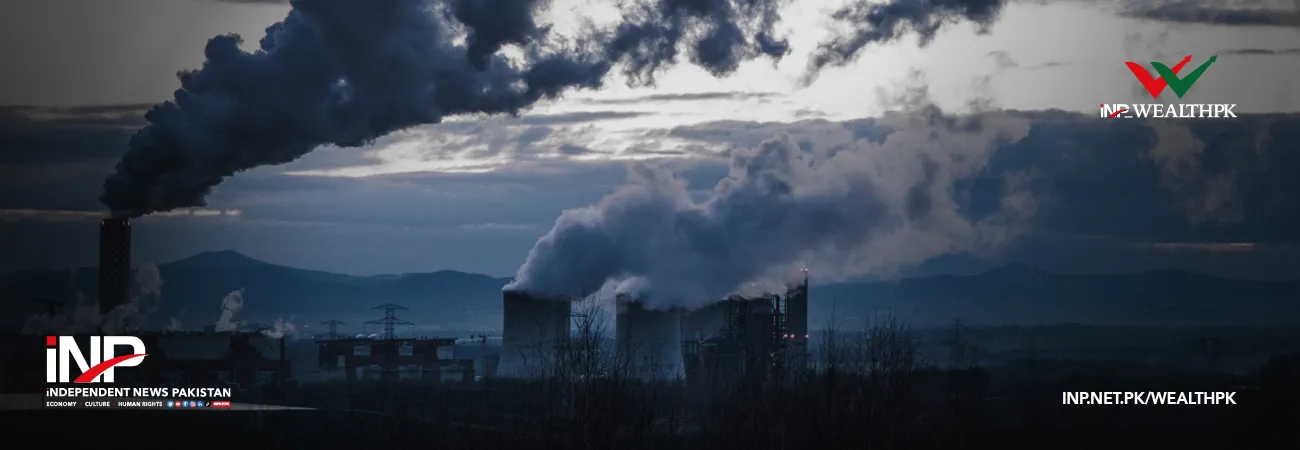آئی این پی ویلتھ پی کے
Faiza Tehseen
Pakistan’s financial and natural resources can be saved to a large extent by combating industrial pollution. The establishment of waste-to-energy or bio-mass energy plants is necessary to address the challenges of a clean atmosphere, opined Kashif Noor Khawaja, an environmental specialist at the World Bank, while talking to WealthPK. “Different industries emit different types of pollutants like liquid, solid waste and fumes. The commercial units causing serious environmental issues are textile, coal power plants and tanneries. They damage natural resources in all industrial sectors. “Water is at the top of natural resources, extremely damaged by them. After use, it is directly thrown into drains/water channels without treatment or recycling, thus contaminating the water sources. No proper regulation in this concern exists in Pakistan to instruct which type of water should be supplied to the industry and for what purpose,” he said. “If we discuss emissions, brick-kilns, coal, diesel, and furnace oil power plants are depleting the air bodies. Most international clients of industrial products from Pakistan insist on changing the production power module to renewable energy – solar, wind, or biogas. “Water must be treated at the maximum level and reused.
There is a dire need for introducing the concept of zero waste. It is based on the concept of maximum recycling up to 80%. Monitoring, checking, and balancing do not exist. Not a single waste-to-energy or bio-mass energy plant has ever been installed in Pakistan. The government should make it mandatory for all industrial units to reduce their environmental footprint,” said the World Bank environmental specialist. Talking WealthPK, Mussawir Qureshi, an environmental health and safety specialist from the Sindh Local Government Solid Waste Management Department in Karachi, said Pakistan was not superbly involved in environmental degradation but was too vulnerable to its impacts. To mitigate them, it is necessary to adopt climate-resilient techniques, sustainable practices, proper waste management, waste recovery, and clean and green energy. “Multinational companies properly dispose of or recycle waste as per their protocols. On the other hand, the local industrialists are not interested in proper waste disposal. Some industrialists are doing so, but not all. There is a dire need to educate the stakeholders.
If industrialists demonstrate environmental safety as a corporate responsibility, obviously, other people will also learn it. The government should help in establishing treatment plants and disposal units with proper training for the people concerned. Strict law enforcement is also required to ensure environmental safety.” Talking to WealthPK, environmentalist and Director of Planning and Development at the University of Baltistan, Skardu (UOBS), Dr. Zakir Hussain Zakir said, “Industrial environmental pollution degrades air, water, soil, and biodiversity and harms health and finances. Emissions from the industrial units (all forms) require different protocols concerning destruction or recycling. They are thrown directly on land or into the water channels, resulting in contaminated air, water, soil, and melting glaciers. “Right now, due to decreased snowfall and rain, Skardu seems to be hiding in smoke because of increased fuel fumes. So, proper recycling and safe disposal of industrial waste is necessary. It is far less expensive than the impacts of industrial emissions on the environment and life.” Sharing views with WealthPK Dr. Sobia Rose, an environmental research economist at the Pakistan Institute of Development Economics (PIDE), said, “Economic growth in every country takes different stages.
At the initial level, agri-based products are given importance, and then gradually, industrialization starts. It took place in Pakistan in the early 90s. Economic growth increases pollution, which increases parallel to the economic growth. Then, at the next stage, economic growth continues, but pollution decreases because industries are in a position to establish waste treatment plants at a specific level. All the developed countries across the globe grew at the cost of the environment. First, they created pollution, and then they adopted measures to reduce their footprint.” “The main problem in Pakistan is the lack of planning to introduce technology for pollution control. Even when a bilateral trade agreement is signed with other countries, mostly the health, safety and environmental aspects are not addressed properly. We discuss adopting foreign technology but neglect its environmental impacts. “To mitigate environmental losses due to industrialization, a proper database of companies/firms is required showing how many units are responsibly treating their waste and how many never pay heed to the safety protocols. We are direly in need of experts and technology decision-making to maintain environmental labs,” she added.
INP: Credit: INP-WealthPk



